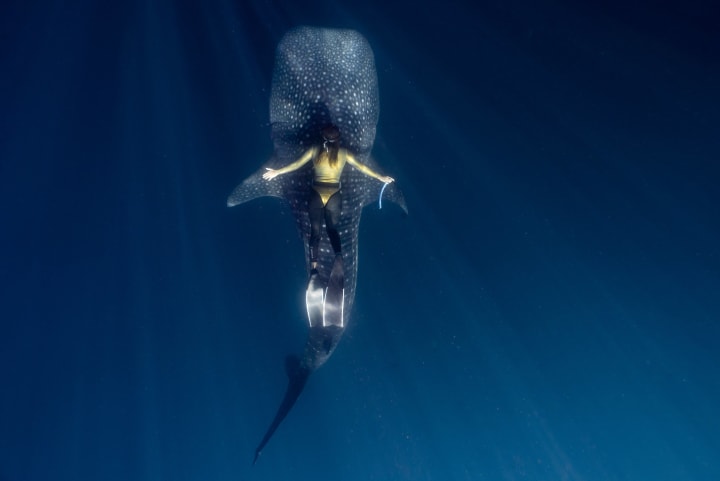Navigating the Depths with Whale Sharks
A Journey into the Heart of Oceanic Splendor

The vast expanse of the ocean conceals mysteries and wonders beyond imagination, and among its gentle inhabitants, the whale shark reigns as the largest fish in the world. With a name that invokes images of colossal proportions and immense strength, the whale shark is, in fact, a docile giant. In this article, we delve into the fascinating world of these awe-inspiring creatures, exploring their characteristics, behavior, and the crucial role they play in the delicate balance of marine ecosystems.
Whale sharks (Rhincodon typus) are true marvels of nature, boasting a distinctive appearance that sets them apart from other shark species. These gentle giants can reach lengths of up to 40 feet or more, making them the largest fish in the ocean. Despite their massive size, whale sharks are filter feeders, primarily consuming plankton, small fish, and microscopic organisms that they filter through their colossal mouths.
One of the most captivating features of the whale shark is its striking pattern of pale yellow spots and stripes that adorn its dark grayish-blue skin. Each individual's pattern is unique, serving as a natural fingerprint for researchers and enthusiasts alike. The skin of these magnificent creatures is also notably thick, providing protection from parasites and abrasions.

Whale sharks are found in tropical and warm-temperate seas around the globe, making appearances in both open ocean and coastal areas. While they are known to traverse vast distances, their exact migratory patterns remain a subject of ongoing research. Scientists have discovered that whale sharks often congregate in certain areas during specific times of the year, such as near coastal upwellings where plankton and other small prey are abundant.
Despite their migratory tendencies, whale sharks are known for returning to specific locations, earning them the nickname "homebodies of the sea." This behavior has made certain hotspots, like the Ningaloo Reef in Australia and the waters off the Yucatán Peninsula in Mexico, popular destinations for those seeking to witness these gentle giants in their natural habitat.

Despite their enormous size, whale sharks are filter feeders, utilizing their wide mouths to gulp in large volumes of water. As water passes through their gills, specialized structures called gill rakers filter out small organisms, ensuring that only nutrient-rich water continues into their digestive system. This feeding method allows whale sharks to sustain themselves on a diet consisting primarily of plankton and small fish, and it helps maintain the delicate balance of marine ecosystems.

The immense size and seemingly intimidating appearance of whale sharks might lead one to believe they pose a threat to humans. However, these creatures are remarkably gentle and pose little to no danger to humans. In fact, they often exhibit a curious and tolerant demeanor when encountering divers and snorkelers.
Despite their generally amicable nature, whale sharks face threats from human activities. Collisions with boats, entanglement in fishing gear, and the impact of climate change on their prey are among the challenges these giants must contend with. Recognizing the importance of protecting these magnificent creatures, numerous countries have implemented conservation measures, including marine reserves, regulations on boat traffic, and educational initiatives to raise awareness about the importance of preserving whale shark habitats.

The increasing interest in marine conservation and the allure of witnessing these majestic creatures in their natural environment has given rise to whale shark eco-tourism. Responsible tourism practices, such as maintaining a safe distance and adhering to ethical guidelines, allow enthusiasts to experience the wonder of swimming alongside these gentle giants without causing harm.
Furthermore, the growing popularity of whale shark tourism has provided researchers with valuable opportunities to study these elusive creatures up close. Advances in technology, such as satellite tags and underwater drones, have enabled scientists to track their movements, understand their migratory patterns, and gain insights into their behavior, contributing to ongoing efforts to conserve and protect this species.

In the vast and mysterious realm of the ocean, whale sharks stand out as remarkable ambassadors of the sea. Their enormous size, distinctive appearance, and gentle nature captivate the hearts of marine enthusiasts and researchers alike. As we continue to uncover the secrets of these gentle giants, it becomes increasingly clear that their well-being is intricately connected to the health of our oceans. Through responsible conservation efforts, sustainable tourism practices, and ongoing research, we can ensure that future generations will have the privilege of sharing the seas with these enchanting creatures – the gentle giants of the deep.
About the Creator
Scott Richards
Devoting my spare moments to crafting tales about animals. The beauty of nature brings me immense joy. If this resonates with you, consider subscribing to stay updated and never miss a story.






Comments
There are no comments for this story
Be the first to respond and start the conversation.